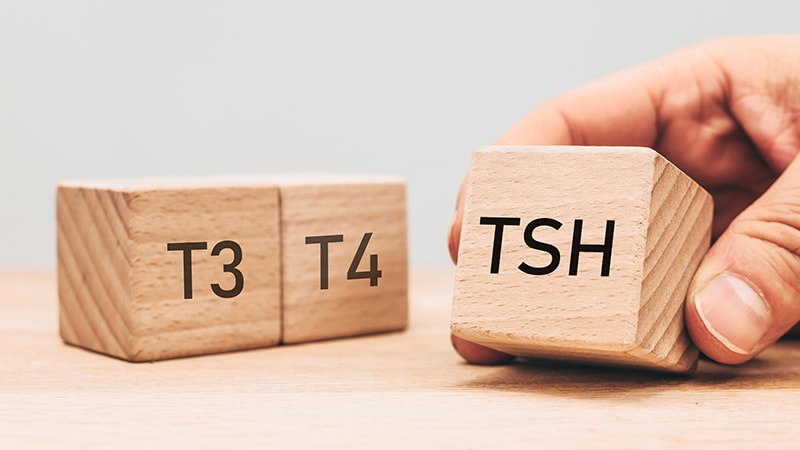New Recommendations for LT3 in Hypothyroidism Treatment
Core Concepts
LT3 may be beneficial in hypothyroidism treatment.
Abstract
The Joint British Thyroid Association/Society recommends considering liothyronine (LT3) in combination with levothyroxine (LT4) for hypothyroid patients with persistent symptoms. Despite mixed evidence, the debate over LT3/LT4 therapy continues. The consensus statement outlines key conditions for considering combination therapy and emphasizes the importance of clinical judgment in prescribing LT3. Alternative treatments like desiccated thyroid extract are also discussed.
Highlights
- LT3 may be useful in some hypothyroid patients with persistent symptoms.
- Debate over LT3/LT4 therapy persists despite inconclusive evidence.
- Guidelines outline conditions for considering combination therapy.
- Clinical judgment is crucial in prescribing LT3.
- Alternative treatments like desiccated thyroid extract are mentioned.
Insights
- Majority of hypothyroid patients respond well to levothyroxine.
- Debate over LT3/LT4 therapy has lasted over two decades.
- Patients may experience ongoing symptoms despite biochemical normalization.
- Alternative treatments like desiccated thyroid extract are considered.
- Clinical judgment is emphasized in prescribing LT3.
Customize Summary
Rewrite with AI
Generate Citations
Translate Source
To Another Language
Generate MindMap
from source content
Visit Source
www.medscape.com
T3 in Hypothyroidism Gets Extra Recommendation, With Caveats
Stats
"For the small minority of patients who remain symptomatic despite adequate biochemical replacement with levothyroxine, a trial of liothyronine/levothyroxine combination therapy under specialist supervision may be appropriate."
"The scientific community is divided as to whether or not the LT4/LT3 combination therapy has any value whatsoever."
"In reality, many patients with subclinical hypothyroidism [TSH 5-10 mU/L] are now treated with levothyroxine, fueling a rise in its use."
Quotes
"The scientific community is divided as to whether or not the LT4/LT3 combination therapy has any value whatsoever."
"I welcome this joint statement very much because it provides guidance, especially for clinicians, on a hotly debated issue."
"In reality, many patients with subclinical hypothyroidism [TSH 5-10 mU/L] are now treated with levothyroxine, fueling a rise in its use."
Key Insights Distilled From
by Nancy A. Mel... at www.medscape.com 07-20-2023
https://www.medscape.com/viewarticle/994595
Deeper Inquiries
What are the potential risks associated with LT3/LT4 combination therapy?
The potential risks associated with LT3/LT4 combination therapy include the risk of arrhythmias, accelerated bone loss, and stroke due to iatrogenic hyperthyroidism. It is crucial for clinicians to monitor patients closely for these risks, especially considering the short half-life of LT3. Splitting doses across 24 hours is recommended for many individuals to minimize the risks associated with the therapy.
How can clinicians effectively differentiate between persistent hypothyroid symptoms and other underlying conditions?
Clinicians can effectively differentiate between persistent hypothyroid symptoms and other underlying conditions by conducting a thorough evaluation of the patient's medical history, symptoms, and laboratory test results. It is essential to confirm a diagnosis of overt hypothyroidism before considering LT3 therapy. Additionally, clinicians should exclude other potential causes of symptoms, such as anemia, iron deficiency, autoimmune diseases, diabetes, and menopause. Using a comprehensive approach and ruling out other possible conditions can help clinicians make an accurate diagnosis and determine the most appropriate treatment plan for the patient.
How can patient education be improved regarding alternative treatments like desiccated thyroid extract?
Patient education regarding alternative treatments like desiccated thyroid extract can be improved by providing clear and accurate information about the benefits and risks of these treatments. Clinicians should engage in open and transparent discussions with patients, explaining the differences between desiccated thyroid extract and standard LT4 therapy. Patients should be informed about the origins of desiccated thyroid extract, its potential variability in hormone content, and the lack of standardized dosing compared to LT4. Emphasizing the importance of following medical advice and not self-prescribing or accessing medications without proper guidance is essential. By empowering patients with knowledge and involving them in shared decision-making, clinicians can enhance patient understanding and promote informed choices regarding alternative treatments for hypothyroidism.
0
